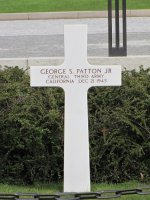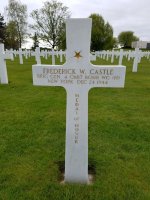I've read so many opinions on this subject . Americans don't seem to respect Monty and the Btits love him to this day . They say the failure of Market Garden was actually the fault of the allies . Patton was a good General but he did have a mouth that got him in constant trouble . Zhuchov was a beast .
You are using an out of date browser. It may not display this or other websites correctly.
You should upgrade or use an alternative browser.
You should upgrade or use an alternative browser.
WW2 generals question.
- Thread starter NYlakesider
- Start date
That war could have easily gone a different way if it were not for Hitler's constant meddling in things that he knew nothing about . Germany possessed some brilliant minds in all aspects of science , the military , engineering , etc.Rommel's The German generals were hamstrung by Hitler's micromanagement and tight control.
BLACKHAWKNJ
Member
- Joined
- Oct 25, 2006
- Messages
- 6,218
- Reaction score
- 6,681
Monty has a bad rep because of his ego and his lack of tact.
There were so many different general officers amongst the various combatants and services in WW2 that I don't know how any one of them could be singled out and designated "most feared".
I've paid my respects at the graves of General Patton, who is buried at the Luxembourg American Military Cemetery and Memorial (facing the troops, of course) and posthumous Medal of Honor recipient General Frederick Castle, who was killed in action at age 36 on Christmas Eve, 1944, leading a B-17 mission, and who is buried at the Henri-Chapelle American Cemetery and Memorial in Belgium...
BRIGADIER GENERAL FREDERICK W. CASTLE > Air Force > Biography Display
I've paid my respects at the graves of General Patton, who is buried at the Luxembourg American Military Cemetery and Memorial (facing the troops, of course) and posthumous Medal of Honor recipient General Frederick Castle, who was killed in action at age 36 on Christmas Eve, 1944, leading a B-17 mission, and who is buried at the Henri-Chapelle American Cemetery and Memorial in Belgium...
BRIGADIER GENERAL FREDERICK W. CASTLE > Air Force > Biography Display
Attachments
SnidelyWhiplash
Member
Rommel took and then lost N. Africa. Then he lost Normandy. Too bad he wasn't on our side and had support.
In North Africa Rommel was also saddled with the Italians who were even worse supplied and had poor leadership.
SnidelyWhiplash
Member
I think the most feared general should be Eisenhower. He ran the show, directed the other generals and put together the Normandy invasion.
While he was not in the field, he articulated a pretty good campaign.
Eisenhower was in a tough position but had the ability to handle it.
Ike has been known as a nice guy…like everyone's grandpa. But he was as ambitious and decisive as anyone. Richard Nixon…no stranger to making decisions himself…said Eisenhower was the most cold-hearted man he ever saw when it came to making a decision.
I have no idea who was the most feared. All I can say is if I could pick one general to lead MY army against MY enemies it would be Patton. And he would be the LAST one I would want to have to defend against. When it comes to tactical savvy, sheer will, common sense and junk-yard-dog aggressiveness He's my man!
UncleEd
Member
Question about "most feared" perhaps should
be tempered by the question "who should have
been the most feared?"
And that muddles the situation.
Take the question of Ike; he did badly in North
Africa but got his ducks all in a row afterward.
He was tasked by Marshall and FDR to, putting
it simply, "go win the war." I think Nimitz in
the Pacific had the same order.
Gens. MacArthur and Patton always kept the
U.S. war department worried as much they
they might have worried the Japanese and Germans.
be tempered by the question "who should have
been the most feared?"
And that muddles the situation.
Take the question of Ike; he did badly in North
Africa but got his ducks all in a row afterward.
He was tasked by Marshall and FDR to, putting
it simply, "go win the war." I think Nimitz in
the Pacific had the same order.
Gens. MacArthur and Patton always kept the
U.S. war department worried as much they
they might have worried the Japanese and Germans.
While I have respect for McArthur I think he was a showboater and an eliteist. I have a ton of respect for General Jonathan (Skinny) Wainwright; Given an impossible task he did everything asked and more then went thru the being a Prisoner of War. He removed from the camps and was on the Missouri when Japan sighed the surrender paperwork.
Last edited:
SnidelyWhiplash
Member
MacArthur was both brilliant and stupid. When he was right…he was brilliantly so. When he screwed up…just as hugely. His ego was as big as his intellect and he was the only US general who had a public relations section dedicated just to him.
I'd say Patton was the most feared, both by the Axis for his tactical and strategic knowledge, and by the Allies for his mouth...Montgomery wouldn't get into my top 100... ...Ben
...Ben
twodog max
Member
I would vote Zhukov because he was feared by the Germans as he kicked them back to Berlin but also Stalin must have feared him somewhat as he had no problem in liquidating potential competitors. He had to have been a tough man.
Eisenhower's genius was logistics, not battle. He knew that the side that was able to equip, arm, and feed it's soldiers was going to win. Germany could never do it in sufficient quantities.
I've been watching an interesting series on YouTube called "War Factories." It's about the efforts of both sides to keep material flowing to the front lines.
It's a fairly recent (2019) series. I don't know if it's available anywhere but YouTube, but it was clearly intended for broadcast on TV.
I've been watching an interesting series on YouTube called "War Factories." It's about the efforts of both sides to keep material flowing to the front lines.
It's a fairly recent (2019) series. I don't know if it's available anywhere but YouTube, but it was clearly intended for broadcast on TV.
I think the most feared general should be Eisenhower. He ran the show, directed the other generals and put together the Normandy invasion.
While he was not in the field, he articulated a pretty good campaign.
Faulkner
Member
I much admire General Jimmy Doolittle. He could run circles around many of his Army colleagues in tactical and strategic planning and implementation, yet was not boisterous about it and certainly shunned the media (unlike MacArther, Patton, Montgomery, and Admiral Halsey).
Basically, Doolittle just got the job done.
Basically, Doolittle just got the job done.
SnidelyWhiplash
Member
Eisenhower's genius was logistics, not battle. He knew that the side that was able to equip, arm, and feed it's soldiers was going to win. Germany could never do it in sufficient quantities.
I've been watching an interesting series on YouTube called "War Factories." It's about the efforts of both sides to keep material flowing to the front lines.
It's a fairly recent (2019) series. I don't know if it's available anywhere but YouTube, but it was clearly intended for broadcast on TV.
Eisenhower in the early 1920s was tasked with taking a large formation from coast-to-coast as an experiment. It took something like two months considering the lack of a cohesive road net along with mechanical issues.
Towards the end of WWII he saw the German Autobahn and used it to great effect…he didn't forget that. That experience is what was the impetus behind the interstate traffic system being designed during his Presidential Administration.
Last edited:
SnidelyWhiplash
Member
I much admire General Jimmy Doolittle. He could run circles around many of his Army colleagues in tactical and strategic planning and implementation, yet was not boisterous about it and certainly shunned the media (unlike MacArther, Patton, Montgomery, and Admiral Halsey).
Basically, Doolittle just got the job done.
Doolittle was a can-do guy. Before he took command of the 8th Air Force in the UK…the standing orders of the 8th Fighter Command was "The job of the Fighter Command is to bring the bombers home." Upon his arrival Doolittle had the orders changed to "The job of Fighter Command is to destroy the Luftwaffe."
Rather than keeping the fighters tethered close to the bombers to fend off defending fighters they were freed up to go ahead of the bombers and shoot down or destroy on the ground the German fighters so they couldn't get near the bombers to begin with.
The man was forward thinking to say the least.
AJ
US Veteran
MacArthur was a showman. Patton was a showman, but also a very good tactician. Bradley was not a showman, but was a good tactician. Both atton and Bradley got the best out of their men. Of the Commanders mentioned I was pick Patton. He did not have a PR Department, but could have used one at times.
There were several good Marine Generals, but they never got to command Armies. The only time that one did (due to death of the Commander), he was very shortly replaced by a Army General flown in from Washington.
There were several good Marine Generals, but they never got to command Armies. The only time that one did (due to death of the Commander), he was very shortly replaced by a Army General flown in from Washington.
- Joined
- Oct 17, 2006
- Messages
- 7,772
- Reaction score
- 7,184
In re: post 36
The Allies shot the bleep out of the European railroad system thinking it would paralyze German material supply. The Autobahn took up a lot of slack. Ike realized the potential here.
Long ago I read a German critique of our tactics in Europe. The USA was noted for selecting the best roads as the axis of attack. That does work both ways though, see Falaise Gap.
The Allies shot the bleep out of the European railroad system thinking it would paralyze German material supply. The Autobahn took up a lot of slack. Ike realized the potential here.
Long ago I read a German critique of our tactics in Europe. The USA was noted for selecting the best roads as the axis of attack. That does work both ways though, see Falaise Gap.
I can't say which general was most feared, but I do know they feared the arsenal of democracy and our unparalleled ability to supply the troops. Logistics and supply chain won the war. The best soldiers and strategy without supply will fail.
Feared not "best"
A significant portion of German leadership felt, for several weeks, the Normandy invasion could well be a ruse as it was reported by their intelligence that George Patton was still in England with his "shadow army" (First United States Army Group), which was true. Their assumption that Patton would lead the invasion lends support to his being considered the most able, certainly the most aggressive, capable, Allied field commander in the European Theater of Operations from the German point of view.
Given the efforts the U.S. made to eliminate Admiral Isoroku Yamamoto, and the logistics involved, lends support to our fear of his planning and leadership skills in the Pacific Theater of Operations.
I agree with others about Georgy Zhukov. It was plain the Wehrmacht didn't much like being lined up across from his command on the Eastern Front. He also beat the pulp out of the Japanese in the far east in 1939 when the Imperial Japanese Army got a bit too close to Russian territory in Manchuria. They remembered him with respect.
German general Heinz Wilhelm Guderian was respected by allied intelligence as capable and aggressive panzer commander. Guderian was arguably the most "feared" German field general. Rommel was well respected but not sure he instilled a great fear factor among allied leadership. He was actually rather well-liked.
Admiral Halsey might have been feared by the Imperial Japanese Navy due to his aggressive fighting characteristics but he proved very predictable and the IJN ultimately took advantage of that.
Admiral Raymond Ames Spruance proved our most capable front line admiral of WWII but it's unknown how much the IJN feared him. They certainly should have.
General Curtis LeMay should have been feared by Imperial Japanese leadership, unsure how well their intelligence identified Allied leadership late in the war. He figured out the strategy of flying B-29s at low altitudes and dropping incendiaries rather than (very) high altitude iron bombing. Japan suffered greatly from this change in tactical manifestation of the bombing strategy of the home islands.
There were some superb general officers in WWII that are largely unknown today. One example is Vice Admiral Willis Augustus "Ching" Lee Jr. Lee was the most outstanding gunnery officer in the U.S Navy and was virtually the only admiral you'd want in command of a naval gun battle against Japanese capital ships. Not sure how well the IJN knew him so unknown fear factor. An amazing guy who also won five gold Olympic medals for pistol marksmanship. Lee understood how to hit targets with projectiles in a way few others ever have; didn't matter if it was .22 LR at 50 feet or 16-inch/45 caliber rifles mounted in triple turrets at 12 miles.
Bryan
A significant portion of German leadership felt, for several weeks, the Normandy invasion could well be a ruse as it was reported by their intelligence that George Patton was still in England with his "shadow army" (First United States Army Group), which was true. Their assumption that Patton would lead the invasion lends support to his being considered the most able, certainly the most aggressive, capable, Allied field commander in the European Theater of Operations from the German point of view.
Given the efforts the U.S. made to eliminate Admiral Isoroku Yamamoto, and the logistics involved, lends support to our fear of his planning and leadership skills in the Pacific Theater of Operations.
I agree with others about Georgy Zhukov. It was plain the Wehrmacht didn't much like being lined up across from his command on the Eastern Front. He also beat the pulp out of the Japanese in the far east in 1939 when the Imperial Japanese Army got a bit too close to Russian territory in Manchuria. They remembered him with respect.
German general Heinz Wilhelm Guderian was respected by allied intelligence as capable and aggressive panzer commander. Guderian was arguably the most "feared" German field general. Rommel was well respected but not sure he instilled a great fear factor among allied leadership. He was actually rather well-liked.
Admiral Halsey might have been feared by the Imperial Japanese Navy due to his aggressive fighting characteristics but he proved very predictable and the IJN ultimately took advantage of that.
Admiral Raymond Ames Spruance proved our most capable front line admiral of WWII but it's unknown how much the IJN feared him. They certainly should have.
General Curtis LeMay should have been feared by Imperial Japanese leadership, unsure how well their intelligence identified Allied leadership late in the war. He figured out the strategy of flying B-29s at low altitudes and dropping incendiaries rather than (very) high altitude iron bombing. Japan suffered greatly from this change in tactical manifestation of the bombing strategy of the home islands.
There were some superb general officers in WWII that are largely unknown today. One example is Vice Admiral Willis Augustus "Ching" Lee Jr. Lee was the most outstanding gunnery officer in the U.S Navy and was virtually the only admiral you'd want in command of a naval gun battle against Japanese capital ships. Not sure how well the IJN knew him so unknown fear factor. An amazing guy who also won five gold Olympic medals for pistol marksmanship. Lee understood how to hit targets with projectiles in a way few others ever have; didn't matter if it was .22 LR at 50 feet or 16-inch/45 caliber rifles mounted in triple turrets at 12 miles.
Bryan
Last edited:
Similar threads
- Locked
- Replies
- 45
- Views
- 9K
- Replies
- 51
- Views
- 11K
- Replies
- 47
- Views
- 5K
- Locked
- Replies
- 26
- Views
- 11K
- Locked
- Replies
- 10
- Views
- 7K



